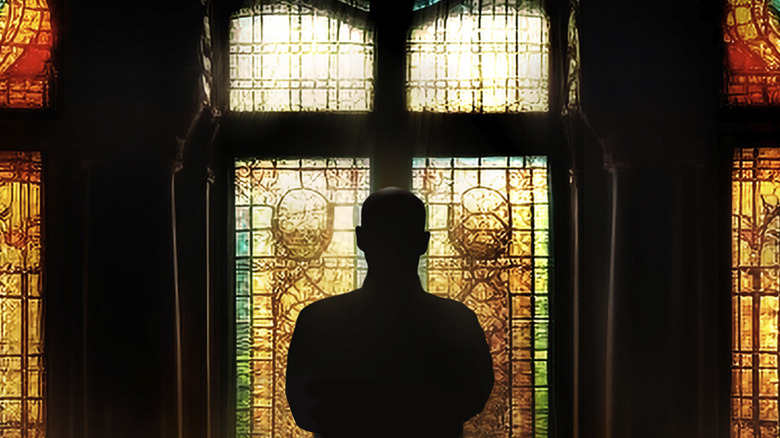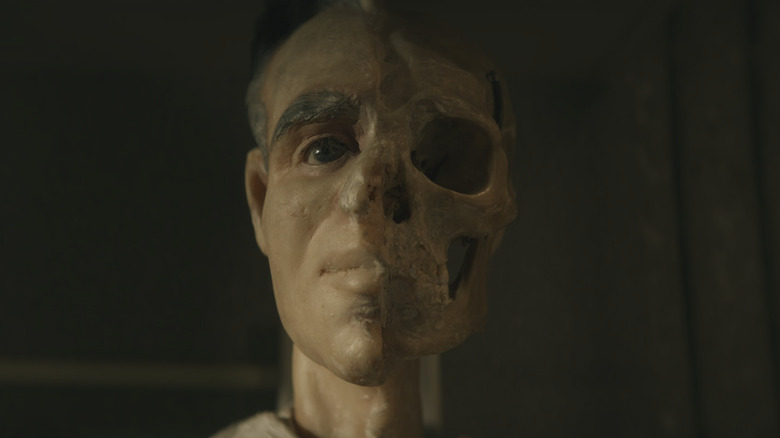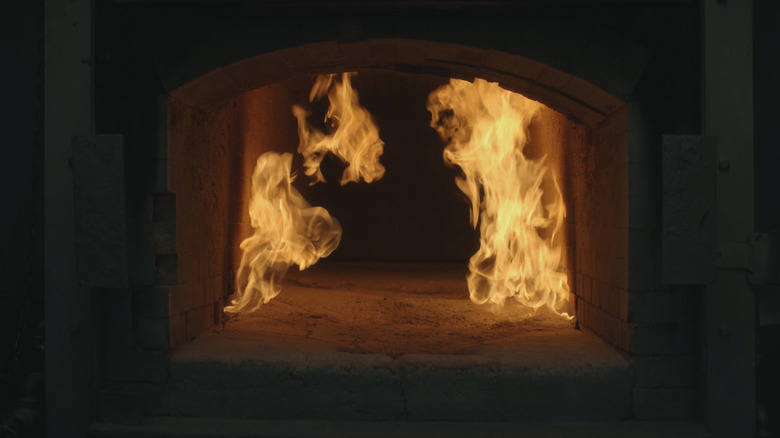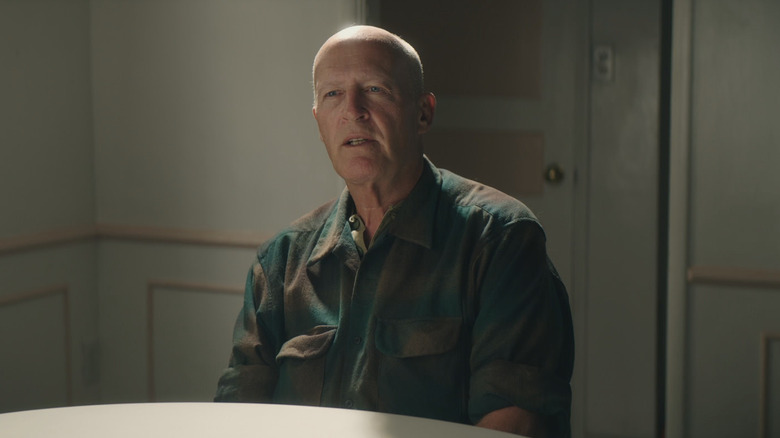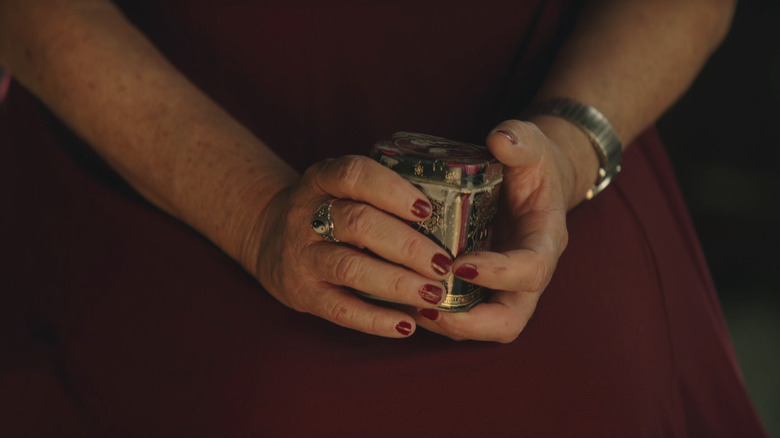The Mortician Director Talks About The Jaw-Dropping Ending To His HBO True-Crime Doc [Exclusive Interview]
I missed director Joshua Rofé's 2021 documentary about painter Bob Ross, but I absolutely devoured his three-episode true crime series "Sasquatch" a few years ago, which followed an investigative journalist on the hunt for the truth about a triple murder in the Pacific Northwest that was rumored to have been committed by Bigfoot. It's a jaw-dropping show (do yourselves a favor and check it out if you missed it), and Rofé has returned to drop our jaws once again with "The Mortician," the HBO documentary series that just wrapped its third and final episode. After watching this, I won't be missing any of his projects again.
"The Mortician" tells the story of David Sconce, the son of beloved funeral home owners in Southern California who takes over a portion of the family business in the 1980s and gets in severe legal trouble for his ... unorthodox cremation methods. The show has one of the most incredible endings I've seen in quite some time (it transcends the genre and is straight-up one of the best TV moments of the year so far), and during a recent interview, I had the chance to ask Rofé about what was going through his mind during that crucial moment, his secret to making a true-crime doc that doesn't overstay its welcome, and more.
Note: This interview has been lightly edited for clarity and brevity, and it contains major spoilers. Don't proceed unless you've seen all three episodes.
Here's the secret to making a great true-crime documentary
One of the biggest complaints I have about true-crime documentaries is they often feel like they're padding out the story just to make the thing longer without actually providing a lot of extra information that feels vital to the narrative. I've now seen two of your doc series — "Sasquatch," which I loved, and now "The Mortician" — and you have not fallen into that trap. So what is the secret to making a true-crime doc that does not overstay its welcome?
Joshua Rofé: I think that both I and my producing partner, Steven Berger, who I do everything with, we have a fear of being accused of what you just said. Because we feel the same way, and we feel that if we as an audience are going to give you our time, you need to value it. And that doesn't mean stretch something to six episodes so all the executive producers can make more money. We really feel that a story should be told in the way that it begs to be told. So if that's a 90-minute feature or a two and a half hour feature, great. If it's a series that's three episodes or six episodes, great. I mean, [Ezra Edelman's "O.J.: Made In America"] is such a great example of, it did not overstay its welcome for a second, and I think in total it might be like seven and a half hours long. It was tight. It was a tight seven and a half hours, right? So episode count isn't necessarily a determining factor in terms of whether something overstays its welcome or not. It's just a story demands what it demands, and I just really believe that it's your responsibility as a filmmaker to just be really sensitive to that and I have a deep desire to make the best s*** that I can make, and that's the only path.
Totally. So when you're thinking about subjects for a documentary project like this, how much are you thinking about how relevant the overall story is to things that are happening today? Is that a factor in your decision-making at all?
Truly not at all. It just comes down to, I can't stop thinking about this. I feel like I'm going to die if I don't get to make this. If I am walking around the house or I'm on the phone with a friend or a family member or whoever, and I am just saying, "Oh my God, if I get to make this thing, I think it could really be so good." It's that. That's the only place it comes from. It's just this deep, deep desire and obsession to be able to tell whatever this story is. It gets its hooks in you and you feel like you must. That's really what it is.
The Mortician became Rofé's take on a classic L.A. noir
So how did a project like this come to you? You're now a figure in this world, in this kind of storytelling mold, if you will. Are people pitching you ideas? Are you still doing the same research you were doing years ago and just stumbling across this stuff yourself? Is your producer bringing ideas to you? How does that work?
It's kind of all of the above. It definitely has reached the point where people pitch me stuff. I haven't ... that's actually not true. There's two great ones that we're in the process of producing now, but prior to this — I was about to say I haven't done it — but in terms of me directing, I haven't done anything that I've been just offered outright. And that includes a green-lit doc at a streamer about Crypto story of the moment. It's like, come on. I don't give a s*** about that. These things are so hard to make. I have to be just madly in love with them. So we search, Steven and I, and one of our really most trusted colleagues is the head of our research. His name is Lukas Cox. We look, and we look, and we look.
I happened to find this during a rabbit hole that I was going down in December 2020. I was editing "Sasquatch" and "Bob Ross" at the time and knew they would be finished the following year. And I really love L.A. noir stories — "The Long Goodbye," "Sunset Boulevard," "Chinatown," "Mulholland Drive" — I love these things and I've always wanted to make one. And so I just went on a "L.A. noir in the form of documentary" hunt, if you will, and I ended up on these old L.A. Times articles about this story. And was immediately hit with that thing of, oh my God, if I could make this, I feel like this could be really, really special. But I knew it all depended on getting an interview with David Sconce because I feel as though if you're going to tell a story like this and have it really feel like you've gone deep and it being worthy of anybody's time, you've got to have the guy.
So we wrote to him in prison and he got on the phone with my producer and he agreed to do an interview, if and when we came in to the prison to film with him there or if he got out, because parole was on the table at that point. He didn't know when, but it was on the table. And since it was really peak Covid, nobody was getting led into prisons to shoot. And California specifically does not allow you to make inmate specific interview requests.
So I kind of knew we weren't going to get in, and I needed him, if this interview was going to happen, to get out. And he didn't get out for another two and a half years. We started making this, in effect, by the end of 2021, and we got notified that he was going to have a parole hearing late 2022, and that was an election year. Every governor will rescind parole hearings that are leading up to the election because they have to show that they're tough on crime. That's what they're all running on in some capacity.
So sure enough, his got yanked and I really felt like, wow, I may have something that is just not going to pan out and I'm going to be on the hook with HBO and these people are going to just hate me and never want to work with me again. Then about six months later, I was driving, I had just dropped a friend off. We'd had lunch and Steven calls me, my producing partner, and he said, "He is getting out in the next 48 hours. He's been granted parole." So we immediately need to mobilize the crew. I mean, my DP lives in New York. [David] was locked up outside of Sacramento. The next morning, Steven and I drove up to Sacramento. People are on planes, people are driving up, equipment is getting checked out of rental houses, and by that next night, we were sitting in a hotel just prepared.
That morning, I can't remember what time exactly that we pulled into the parking lot at the prison. I don't think it was 4:30, but it was soon after that. It was probably about 5 AM. And we sat and we sat and the sun comes up and other people are pulling into the parking lot waiting to pick up a person who they're waiting for. And we see corrections officers pulling in to go to work for the day and some who are checking out people in the administrative building. And then finally around 7:45, out people come, and we're looking for him and we thought, oh my God, there he is. And he sees us and he's got a big smile on his face and he points at us, and we're rolling the whole time. And he got in the car, and I don't even know that we were three minutes down the road outside of the prison parking lot when he just, on his own, brought up the mortuary, the cremations, I don't want to say everything, but for not getting asked a question, he brought up a lot. And I just thought, holy f***, this is going to be a crazy couple of days.
Man, that's an incredible story.
Joshua Rofé talks about The Mortician's incredible ending
I want to talk to you about the ending of the finale. It's just an extraordinary ending and an incredible television moment. Do you remember what you were thinking in those moments when David seemed to be on the precipice of revealing something to you, and what was going through your head when the camera operator was telling you that you had to pause the interview?
I couldn't believe what just happened. I also was thinking, God, he really wants to tell me this information off camera ... to make me complicit in some way? I mean, does he really think that I will agree to be in possession of this type of information and I'm just going to keep it a secret? He's telling me, "You got to promise not to tell anybody," [so that's why] I said, "Well then, I don't want to know because my job is actually that I tell, and so you're not going to rope me into keeping something like that a secret. I'm not in the trenches with you in that way." It's all happening in the moment in just a few seconds, and I can see the look in his eye and I cannot believe what just happened.
And my crew, Ronan Killeen is my DP and has been for about a decade now, and Dennis Haggerty is my sound person and also has been for a decade. We looked at each other afterwards. And Steven Berger, my producing partner, in the moment, our eyes were darting to each other in the minute or so after it happened, and it was just like, holy f***. That did just happen. And I knew that we had our ending.
That's unbelievable. I'm so glad that you were able to continue rolling for as long as you did. Did you go back and talk to any of your other interview subjects, the ex-wife or anybody, about what David was hinting at in those final moments?
Well, I can tell you that the man that we shot who is in deep silhouette in shadow, we interviewed him after we interviewed David. We did not tell him what David said, and the number three was his and his alone. And it matched up with David. He said that there were actually three things that he would like to tell me, but it can't be on camera and I can't tell anybody. So that was crazy, that later that summer, we were given this kind of bombshell by this person who had no idea what David had said.
Navigating the streaming landscape as a documentary filmmaker
I probably only have time for one more question. You've made documentaries that have been released by Hulu, Amazon, Netflix, and now Max, soon to be HBO Max again. What are the biggest differences that you've noticed in working with each of those streamers?
I've been really lucky in that whoever buys my project — and these are all sold at the outset, set up at the outset before I've really started making them — they all understand that I'm trying to make something really good. I know that sounds obvious, but I'm trying to make something that is not going to talk down to the audience. I'm not making something that's just going to speed the storytelling along so somebody can look at their phone and then look up and know what's going on. I'm making something for an audience that cares. And I've been fortunate that every time out of the gate, they've really been right there with me.
Because as much as we all complain about the TikTok-ification of life and art and everything, there are still things that are made for adults that are then also really enjoyed by people who are younger than adulthood, also. I just feel like being committed to doing that just keeps me having really honest conversations with people that I am making these things with. So having this thing come out on HBO now is, in a way, it feels like the most exciting version of that. Sunday night, HBO. I know where I am every Sunday night. And this feels not like a culmination, obviously, but it feels like an incredible opportunity to be able to make something and have it come out week to week on HBO.
All three episodes of "The Mortician" are now streaming on Max.
